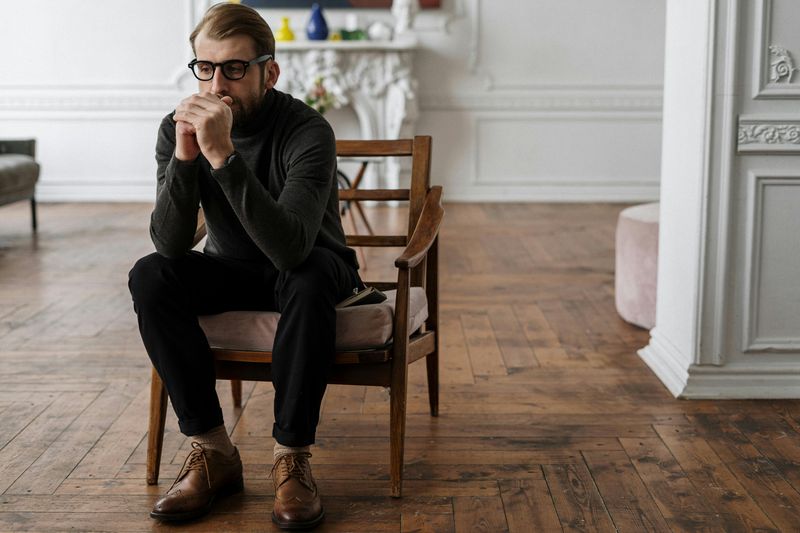15 Quiet Signs He’s Unhappy in the Relationship (Even If He Won’t Say It)

Relationships can feel like reading a book where some pages are missing. You know something’s off, but can’t quite put your finger on it. Men often struggle to express their feelings directly when they’re unhappy. Instead, their dissatisfaction shows up in small behaviors that are easy to miss. Recognizing these subtle signs early might help couples address problems before they become irreparable.
1. Emotional Distance Despite Physical Presence

There’s nothing louder than the silence of someone who’s physically present but emotionally checked out. He looks at you, but doesn’t see you. He’s there, but you feel completely alone.
This emotional checkout happens gradually. You’ll notice fewer meaningful exchanges and more blank nods or generic responses. He’s physically there, but his emotional energy has left the building.
Many men retreat inward when unhappy rather than voicing their concerns. This invisible barrier grows thicker with time, creating a lonely togetherness that feels more isolating than actual solitude.
2. Conversations That Quickly Fizzle Out

Remember those late-night talks that lasted for hours? Now they’ve been replaced by short exchanges about groceries and bills. When you try to dig deeper, he responds with one-word answers or quickly changes the subject.
Topics that once sparked passionate discussion now elicit shrugs or dismissive comments. You find yourself carrying the conversational weight while he contributes the bare minimum.
This communication breakdown isn’t just frustrating—it’s a warning sign. When a man stops investing in meaningful dialogue, he’s often stopped investing in the relationship’s emotional foundation.
3. Vanishing Physical Affection

It’s the little things—the brush of a hand, a kiss in passing, a gentle touch on your back—that quietly weave connection into a relationship. These simple gestures create intimacy without saying a word.
When they disappear, the physical distance often reflects emotional disconnection. You might notice he no longer reaches for your hand or moves away when you initiate contact.
This withdrawal isn’t always about physical attraction. Often it’s about emotional safety—a man who feels unsatisfied or misunderstood may unconsciously create physical space that mirrors his emotional retreat.
4. Heightened Irritability Over Small Matters

The toothpaste cap left off shouldn’t trigger an explosion. Yet suddenly, these tiny infractions become relationship flashpoints. His fuse has shortened dramatically.
Watch for disproportionate reactions to minor issues. The irritation isn’t really about the unwashed dish or misplaced remote—these are just convenient targets for deeper frustrations he can’t or won’t express directly.
This hair-trigger temper often appears in cycles. Periods of tense calm broken by eruptions over seemingly insignificant matters signal that something much bigger is brewing beneath the surface.
5. Creating Distance Through Busy Schedules

Suddenly his calendar is packed with activities that don’t include you. Work projects mysteriously require late nights. Weekend hobbies expand to fill entire days. Friend gatherings multiply.
One canceled date night becomes two, then three, until quality time together becomes rare. Notice if he eagerly accepts invitations that take him away from home while showing reluctance toward couple activities.
Men often create physical distance when they need emotional space. Rather than confronting relationship issues directly, an unhappy partner might subconsciously build a schedule that minimizes contact, creating breathing room from a connection that feels suffocating.
6. Emotional Walls Replace Vulnerability

Once upon a time, he shared his worries, dreams, and insecurities. Now personal revelations have been replaced by surface-level reports about his day.
Men build emotional fortresses when they feel unsafe or disconnected. You’ll notice him deflecting personal questions or using humor to avoid serious topics. His inner world becomes increasingly off-limits.
This emotional withdrawal often happens subtly. The man who once processed difficult feelings with you now handles everything internally, leaving you wondering what’s happening behind his increasingly guarded expressions.
7. Declining Interest in Physical Intimacy

A shift in physical intimacy isn’t always about libido. When the bedroom goes quiet, it often mirrors a deeper emotional disconnect that words haven’t yet acknowledged.
Watch for patterns, not isolated incidents. Consistent avoidance of intimate situations, minimal physical contact during sex, or going to bed at different times to avoid encounters all suggest emotional withdrawal. Many men connect through physical intimacy, making its absence particularly telling.
What’s most revealing isn’t just the frequency change but the quality. Mechanical, detached physical encounters lacking emotional connection may indicate he’s going through motions while his heart has already checked out.
8. Criticism Outweighs Compliments

Words paint relationship landscapes. When negative comments dominate the canvas, something’s seriously wrong. Listen for the shift in how he speaks to you.
Playful teasing transforms into cutting remarks. Constructive feedback becomes harsh criticism. Appreciation statements disappear while complaints multiply.
This negative focus often stems from festering resentment. An unhappy partner may unconsciously highlight flaws to justify their emotional withdrawal. When you catch yourself walking on eggshells to avoid criticism or can’t remember his last genuine compliment, recognize this red flag waving in your relationship winds.
9. Fading Interest in Your Daily Life

Remember when he couldn’t wait to hear about your day? That curiosity has vanished. Your stories now meet with distracted nods rather than engaged questions.
He’s stopped tracking the characters in your work dramas or remembering your upcoming presentations. Your friends’ names have become interchangeable in his mind. The details that make up your world—once fascinating to him—now seem to blur together.
This attention withdrawal cuts deeply because it signals he’s no longer investing in knowing you. When a man stops being curious about your inner and outer worlds, he’s often mentally creating space between your lives.
10. Increasing Secrecy About Personal Matters

It starts small. A glance over the shoulder. A screen turned away. Then come the passcodes you never knew existed and the conversations that die the second you enter the room. The signs may be quiet, but they speak clearly: things have changed.
This isn’t necessarily about infidelity—often it’s about creating psychological space through information control. Pay attention to pattern changes.
A previously open book who suddenly guards his phone, keeps conversations private, or becomes defensive when asked casual questions is building walls. This growing secrecy often represents an emotional exit strategy before a physical one.
11. Nostalgic References to Better Times

“We used to have so much fun together.” This seemingly innocent nostalgia carries a troubling subtext: the good times exist only in the past.
Listen for the tense he uses when discussing your relationship. Present-tense appreciation (“I love how we connect”) has been replaced by past-tense glorification (“We were so good together back then”). This linguistic shift reveals he’s mentally archived your relationship as something completed.
Healthy couples reminisce while building new memories. When a man constantly compares your present unfavorably to your past, he’s telling you he sees more joy behind than ahead—a perspective that makes relationship investment feel pointless.
12. Indifference Toward Your Ambitions

Your biggest cheerleader has left the stadium. Goals that once earned his enthusiastic support now receive lukewarm acknowledgment or subtle discouragement.
Notice how he responds when you share aspirations. Does he change the subject, point out obstacles, or seem annoyed by your excitement? A partner emotionally checking out often withdraws their investment in your future.
This support withdrawal feels particularly painful because it contradicts relationship fundamentals. When your wins no longer feel like his wins, and your dreams seem to inconvenience rather than inspire him, he’s likely detached from the shared future that defines committed partnerships.
13. Unilateral Decision-Making About Major Life Changes

Partnerships thrive on collaboration. When major life decisions become solo projects, something fundamental has shifted. Watch for career moves, financial commitments, or lifestyle changes made without meaningful consultation.
He might inform you of decisions after they’re finalized rather than involving you in the process. This independent approach reveals he’s stopped seeing your lives as truly intertwined.
Each unilateral decision—whether accepting a job across town or purchasing a major item without discussion—signals he’s planning a future where your input matters less, possibly because he’s unsure you’ll be part of that future.
14. Romanticizing Independence and Past Freedom

“Sometimes I miss just answering to myself.” Comments glorifying single life appear in conversation with increasing frequency. These aren’t just casual observations—they’re windows into his mind.
Pay attention when he reminisces about pre-relationship freedoms or envies single friends. Notice if he frequently mentions “what could have been” scenarios or roads not taken. These statements reveal he’s mentally exploring alternative life paths.
This idealization of independence often represents relationship dissatisfaction more than actual desire for solitude. When a man regularly imagines happiness outside your partnership, he’s processing feelings about the relationship’s constraints rather than its benefits.
15. Future Plans That No Longer Include You

Shared tomorrows cement today’s bonds. When “we” disappears from future discussions, the foundation is cracking. Listen carefully to how he talks about upcoming events and long-term plans.
His vacation ideas no longer automatically include you. Career goals don’t consider your shared life. Retirement dreams feature him alone. This linguistic shift from “our future” to “my future” happens subtly.
You’ll notice fewer references to joint plans and more individual aspirations. When a man stops weaving you into his vision of tomorrow, he’s often already emotionally disentangling from the relationship, even if he hasn’t consciously decided to leave.

Comments
Loading…